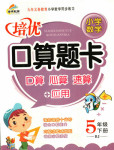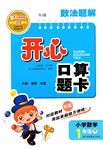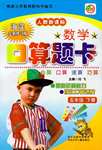
—I’m sorry I took your pen by mistake just now.
—Oh, really? .
A. Don’t mention it B. That’s OK
C. Don’t be sorry D. I don’t care
 培优口算题卡系列答案
培优口算题卡系列答案 开心口算题卡系列答案
开心口算题卡系列答案 口算题卡河北少年儿童出版社系列答案
口算题卡河北少年儿童出版社系列答案科目:高中英语 来源:2014年译林牛津版高中英语必修二第一单元练习卷(解析版) 题型:单项填空
We don’t dismiss the possibility more cases of this kind will come up in the future in carrying out the plan.
A. where B. whether C. why D. that
查看答案和解析>>
科目:高中英语 来源:2014年译林牛津版高中英语必修三第一单元练习卷(解析版) 题型:阅读理解
On a wet Wednesday evening in Seoul, six government employees gathered at the office to prepare for a late-night patrol(巡逻). The mission is to find children who are studying after 10 p. m. and stop them.
In South Korea, it has come to this. To reduce the country’s addiction to private, after-hours tutoring academies(called hagwons), the authorities have begun enforcing a curfew(宵禁令)—even rewarding citizens for turning in violators.
But cramming(临时死记硬背)is deeply anchored in Asia, where top grades have long been prized as essential for professional success. Before toothbrushes or printing presses, there were civil service exams that could make or break you. Chinese families have been hiring test preparation tutors since the 7th century. Nowadays South Korea has taken this competition to new extremes. In 2010, 74% of all students engaged in some kind of private after-school instruction, sometimes called shadow education, at an average cost of KRW 2, 600 per student for a year. There are more private instructors in South Korea than school teachers, and the most popular of them make millions of dollars a year from online and in-person classes. When Singapore’s Education Minister was asked last year about his nation’s reliance on private tutoring, he found one reason for hope, “We are not as bad as the Koreas. ”
In Seoul, legions of students who failed to get into top universities spend the entire year after high school attending hagwons to improve their scores on university admission tests. And they must compete even to do this. At the prestigious Daesung Institute, admission is based on students’ test scores. Only 14% of applicants are accepted. After a year of 14-hour days, about 70% gain entry to one of the nation’s top three universities.
South Koreans are not alone in their discontent. Across Asia, reformers are pushing to make schools more “American”—even as some U. S. reformers make their own schools more “Asian”. In China, universities have begun fashioning new entry tests to target students with talents beyond book learning. And Taiwanese officials recently announced that kids will no longer have to take high-stress exams to get into high school. In South Korea, the apogee of extreme education, gets its reforms right, it could be a model for other societies.
The problem is not that South Korea kids aren’t learning enough or working hard enough, but that they aren’t working smart. When I visited some schools, I saw classrooms in which a third of the students slept while the teacher continued lecturing, seemingly undisturbed.
The government has repeatedly tried to humanize the education system, but after each attempt, the hagwons come back stronger. But this time, its reforms are targeting not just the dysfunctional symptom but also the causes. It is working to improve normal public schools by putting teachers and principals through rigorous(严格的)evaluations—which include opinion surveys by students, parents and peer teachers—and requiring additional training for low-scoring teachers. At the same time, the government hopes to reduce the pressure on students. Admissions tests for high schools have been abolished. Middle schoolers are now judged on the basis of their regular grades and an interview. And 500 admissions officers have been appointed to the country’s universities, to judge applicants not only on their test scores and grades but also other abilities.
1.The six government employees were asked to .
A. arrest the students who work late at night
B. reward citizens who turn in violators
C. conduct a survey among students
D. prevent students from studying too late
2.In Paragraph 3 toothbrushes and printing presses are mentioned in order to .
A. tell us that they were invented in Asia
B. show that hagwons play an important role in people’s daily life
C. show that private tutoring has a long history
D. tell us that civil service exams are of equal importance as them
3.What can be concluded from the passage?
A. Hagwons are the source of South Korea’s educational problem.
B. Students in South Korea don’t learn efficiently.
C. It is the teachers and headmasters who are to blame for the educational problem.
D. Private tutoring is not common in Singapore.
4.The main point of the last paragraph is that .
A. it is very difficult to get rid of hagwons
B. the causes of hagwons have been found
C. teachers will have a hard time because of the reforms
D. the government is determined to reform the present education system
查看答案和解析>>
科目:高中英语 来源:2014年译林牛津版高中英语必修一第二单元练习卷(解析版) 题型:阅读理解
I heard many parents complaining that their teenage children are rebelling(叛逆). I wish it were so. At your age you ought to be growing away from your parents. You should be learning to stand on your own feet. But take a good look at the present rebellion. It seems that teenagers are taking the same way of showing that they disagree with their parents. Instead of striking out boldly on their own, most of them are clutching(紧握)at one another’s hands for reassurance(安慰).
They claim they want to dress as they please. But they all wear the same clothes. Then set off in new directions in music. But somehow they all end up with listening to the same record together. Their reason for thinking or acting in thus-and-such a way is that many people are doing it. They have come out of their cocoon(茧)into a larger cocoon.
It has become harder and harder for a teenager to stand up against the popularity wave and go his or her own way. Industry has firmly carved out a teenage market. These days every teenager can learn from the advertisements what a teenager should have and be.
And many of today’s parents have come to award high marks for the popularity of their children. All this adds to a great barrier(障碍)for the teenager who wants to find his or her own path.
But the barrier is worth climbing over. The path is worth following. You may want to listen to classical music instead of going to a party. You may want to collect rocks when everyone else is collecting records. You may have some thoughts that you don’t care to share with your classmates at once, well, go to it. Find yourself. Popularity will come with the people who respect you for who you are. That is the only kind of popularity that really counts.
1.In this passage, the author wants to tell .
A. teenagers how to learn to decide things for themselves
B. readers how to be popular with people around
C. parents how to control and guide their children
D. people how to understand and respect each other
2.According to the author, many teenagers think they are brave enough to act on their own, but in fact, most of them .
A. have much difficulty understanding each other
B. lack confidence
C. dare not cope with problems single-handed
D. are much afraid of getting lost
3.What does the author think of advertisements?
A. Convincing. B. Influential.
C. Instructive. D. Authoritative(权威的).
4.During the teenage years, one should learn to .
A. differ from others in as many ways as possible
B. get into the right reason and become popular
C. find one’s real self
D. rebel against parents and the popularity wave
查看答案和解析>>
科目:高中英语 来源:2014年译林牛津版高中英语必修一第二单元练习卷(解析版) 题型:单项填空
He can’t tolerate by her again and again during the report, so they quarreled at last.
A. interrupting B. to be interrupted
C. being interrupted D. to interrupt
查看答案和解析>>
科目:高中英语 来源:2014年译林牛津版高中英语必修一第一单元练习卷(解析版) 题型:完形填空
Good friends mean a lot in our life. I used to have some friends who I could . It was my 4th grade in the elementary school that I had my two friends Nina and Nancy. I had known them since the first grade and we had gotten along quite well. Now the memory of their appearance is still in my mind.
The following year I went to a new school. I was shy and didn’t much. The first day I made no new friend and I felt . The next day right after school as we were waiting for our school , I felt someone on my hair, I quickly turned “Why did you do that? ”
“I’m sorry I was stretching. ”Giving her a look, I turned around without saying anything. I had seen my teacher’s eyes as I didn’t want to get into . Then I felt a on my shoulder and turned around again. “What is it? ”“Well umm . . . I have seen you for the first time. For the reason that I was yesterday I was wondering if you’re a new student. ”I nodded and she smiled “Welcome to De Zavala Primary School! I’m Alondra, nice to meet you! ”Then the school bus came and we got on.
And that’s how it all . She was a warm-hearted girl she introduced me to new people and I made a lot of new friends! And I swore I would them because they saved me from the and they didn’t even know. One day, when we were in the 8th grade, Alondra told me she had always wanted a best friend and then I along. I felt so to hear about it. Now I’m in the college and I have many friends: Logan, Mari, Amold, Maggie, and those whose you don’t know.
1.A. go with B. get along C. put up with D. count on
2.A. clean B. blank C. fresh D. invisible
3.A. eat B. talk C. know D. gain
4.A. good B. angry C. bored D. lonely
5.A. doctor B. dinner C. teacher D. bus
6.A. pull B. push C. catch D. put
7.A. angry B. cold C. friendly D. excited
8.A. close B. widen C. narrow D. brighten
9.A. agreement B. danger C. trouble D. touch
10.A. knock B. tap C. strike D. beat
11.A. absent B. lazy C. busy D. strange
12.A. anxiously B. attentively C.nervously D. sincerely
13.A. went B. appeared C. began D. worked
14.A. when B. why C. as D. how
15.A. care for B. thank for C. send for D. seek for
16.A. happiness B. loneliness C.poverty D. fear
17.A. came B. marched C. hurried D. got
18.A. honored B. stable C. uneasy D. sad
19.A. even B. just C. only D. still
20.A. characters B. names C. friends D. grades
查看答案和解析>>
科目:高中英语 来源:2014年译林牛津版高中英语必修一第一单元练习卷(解析版) 题型:单项填空
—Thank you for leading me to the school library.
— . I know you are new here.
A. Never mind B. It doesn’t matter
C. No problem D. You are welcome
查看答案和解析>>
科目:高中英语 来源:2014年外研版高中英语选修十模块7练习卷(解析版) 题型:单项填空
–There is still a copy of the book in the library. Will you go and borrow ______?
–No, I’d rather buy ______ in the bookstore.
A. it; one B. one; one C. it; it D. one; it
查看答案和解析>>
科目:高中英语 来源:2015届甘肃民乐县第一中学高三第一次诊断考试英语试卷(解析版) 题型:阅读理解
Talking plants might sound like characters in a fairy tale. But recent scientific studies have shown that plants communicate with each other and with other living things in a surprising number of ways. To understand them, scientists say, we just have to learn their language. Farmers are especially interested in what plants have to say.
“Plants are able to communicate with all sorts of organisms (有机体). They can communicate with giant bacteria, with other plants and with insects. They do this chemically,” said Cahill, an Ecology Professor of the University of Alberta in Canada.
Plant scientists are just beginning to understand this chemical “language”. Cahill says studies have shown, for example, that plants can evaluate (评估) conditions in their immediate environment and take appropriate actions. Plants have an ability, for example, to signal pain or discomfort caused by anything from temperature extremes to an insect attack. Jack Schultz, a professor of chemical ecology at the University of Missouri, says when a plant senses that it's being eaten, it cannot walk away from trouble; on the contrary, it will release a chemical vapor(蒸汽) that alerts other plants nearby.
“Their language is a chemical language, and it involves chemicals that move through the air that are easy to be changeable, and most of all are smells that we are familiar with,” Schultz explained.
“All plants responded to the attack by changing their chemistry to defend themselves,” Schultz recalled. “But we were quite surprised to find that nearby plants also changed their chemistry to defend themselves, even though they were not part of the experiment.”
Studies have also shown that plants under attack release pleasant chemicals. Those chemicals attract friendly insects that attack the pests eating the plant.
In the end, plants' ability to communicate their needs—and our ability to understand them—could help farmers reduce the use of poisonous chemicals, cut operating costs and limit damage to the environment.
1.The recent scientific studies have shown that plants can ______.
A.communicate with other living things in a chemical way
B.hardly react to any sudden change in temperature
C.use a very special chemica1 language which is familiar to us
D.respond to the attack by giving off poisonous chemicals
2.When being eaten by an insect, the plant will ________.
A.walk away from trouble
B.change its chemistry to kill the insect
C.release a chemical vapor to “ask” other plants for help
D.give off nice chemicals to attract friendly insects killing the pest
3.The underlined word “alert” most probably means “______”.
A.warn B.protect
C.threaten D.allow
4.Which would be the best title for the passage?
A.Communication between Plants
B.A Chemical “Language”
C.Plants Can Talk
D.How Plants Protect Themselves
查看答案和解析>>
湖北省互联网违法和不良信息举报平台 | 网上有害信息举报专区 | 电信诈骗举报专区 | 涉历史虚无主义有害信息举报专区 | 涉企侵权举报专区
违法和不良信息举报电话:027-86699610 举报邮箱:58377363@163.com